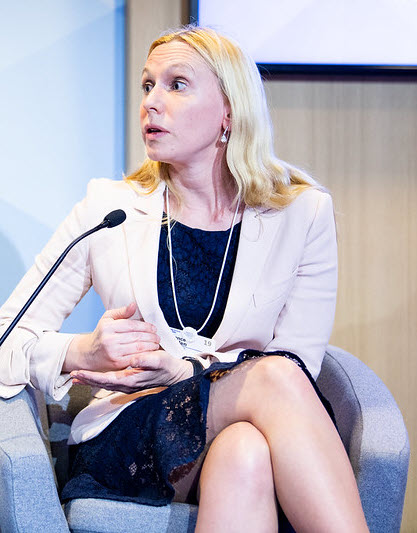The time to act on climate change is now.
That’ll be the message from Dassault Systèmes’ own Florence Verzelen, who’s joining world leaders, diplomats, campaigners and scientists from nearly 200 countries in Egypt for the UN climate change conference, widely known as COP27. This year marks the 30th anniversary of the adoption of the United Nations Framework Convention on Climate Change, and the main focus of these two weeks is on curbing global warming by examining address the complex factors that go into its causes and solutions.
Florence, our executive vice president in charge of Industry, Marketing and Sustainability, is participating on a panel on Thursday, Nov. 10 called Mind the Gap: accelerating sustainable transformation with enabling technologies and innovative policymaking, moderated by Dennis Pamlin, executive director at Mission Innovation and Head of Strategy at Digital with Purpose. You can watch it live, or recorded, here.
Florence and the other speakers – Massamba Thioye, project executive at the UNFCCC Global Innovation Hub; Yu Ping Chan, senior program officer at the UN; and Daniel Matkovits, lead, Digital with Purpose at Global Enabling Sustainability Initiative (GeSI) – will present pragmatic solutions and best practices on the critical role the digital sector can play in enabling transformative changes.

The session will present initiatives around corporate climate action, including the Digital with Purpose Movement and the European Green Digital Coalition, underlining tangible ways in which Information and Communication Technology (ICT) companies such as 3DS are driving sustainable growth through enabling technologies. Ultimately, the speakers will make the case for a deeper involvement of the digital sector to accelerate climate action across different areas, offering the practical solutions and frameworks already deployed that must scale.
We need to act now for the health of the planet
This topic is exactly in line with our work and actions in recent years. As a leading technology company that serves clients from all sectors of the economy, we feel a responsibility to help catalyze more radical, sustainable transformations in the processes that shape the physical world. We’ve made commitments on how to accomplish this through our Sustainability Compass, and have shared a compelling set of case studies through a co-authored study with Accenture, Designing Disruption: The Critical Role of Virtual Twins in Accelerating Sustainability. This report advances the understanding of how virtual twins can help meet the world’s sustainability goals, providing use cases from five industries that show how using this approach can help save 7.5 Gton CO2 eq by 2030 – the equivalent of 1 year of transportation emissions.
Scores of data back up 3DS’s belief that the time to act is now. The 2022 World Economic Forum Global Risk Report Perception Survey showed that over a 10-year horizon, the health of the planet dominates concerns. Environmental risks are perceived to be the five most critical long-term threats to the world, as well as the most potentially damaging to people and planet. Climate action failure, extreme weather and biodiversity loss rank as the top three most severe risks. Some key figures support these concerns:
- By 2030 we may face a 40% shortfall in the freshwater needed to drive the global economy.
- Earth’s animal populations have decreased by nearly 70% since 1970, in large part due to loss of habitat.
- In 2021, global carbon dioxide emissions reached the highest volume ever recorded: 36.3 billion tons,
- 30 % of the world’s population is now exposed to deadly heat waves more than 20 days a year.
Inaction on climate change could cost the world’s economy US$178 trillion by 2070. More than 70 countries, including the biggest polluters – China, the US, and the EU – have set a net-zero target, covering about 76% of global emissions. But changes must also extend to the private sector in order to see the change we need. That’s why 3DS has joined over 1,900 companies by putting in place science-based targets in line with net zero.
The role of virtual twins in driving sustainable innovation
A major way we as a company believe we can help address climate change is through the use of our virtual twin technology. Virtual twins are real-time, virtual representations of a product, process, or a whole system that is used to model, visualize, predict and provide feedback on properties and performance. This means, for example, that you don’t have to build a physical prototype to see if a product will work, saving precious physical resources. You can also use a virtual twin to test endless possibilities to products or processes, including to create the most sustainable, environmentally-friendly options that have the lowest impact on our planet.
During the panel, Florence will share some specific examples of how 3DS is already helping companies in a range of sectors do just that. She’ll tell the story of a UK-based grocery chain using virtual twins to optimize transportation routes to reduce empty mileage, make the most of return journeys and maximize capacity utilization. She’ll explain how a South American cement/concrete company is using virtual twins to strategically plan their operations to lower emissions and fuel consumption. And how by creating virtual twins instead of physical prototypes, a global leader in packaging can propose new packaging solutions 85% faster with improved functionality, recyclability and brand impact.
Digital technologies are critical to supporting governmental climate change initiatives as well. The EU Green Deal, for example, has ambitious targets that require technology to accomplish. As just one example, new eco-design regulations address improving product design – a process that determines up to 80% of a product’s lifecycle environmental impact. When a company adopts an eco-design approach, they can weave sustainability across their entire value network and help drive a circular economy. Our Life Cycle Assessment offering helps an OEM quantify the end-to-end environmental impact of their products and services, from sourcing raw materials to delivering finished goods. In another example, it’s proposed that by 2024 all products in the EU will have to have a Digital Product Passport (DPP) to allow consumers to know the environmental impacts of their purchases, including the characteristics of the product are and the way it was produced, That can’t happen without a clear digital thread, available to all parties across the value chain!

Sustainability is a business imperative
Sustainability is not only a business opportunity, it’s a business imperative. Most companies know the importance of integrating sustainability principles into product and service development, but they’re grappling with how to reinvent their business models to make this happen. Collaboration at every level is needed, and a technology platform supports that.
At 3DS we are committed to reducing our own carbon footprint and to becoming carbon neutral. But we know that the benefit we bring must exceed our own impact, which is why we’ve also committed to sell at least 2/3 of our licenses for sustainability purposes. We’ve seen first-hand what a difference digital technology makes. It’s not just the grocery chain, concrete company and global packaging leader – it’s in every other industry, from automobile manufacturers to construction companies to organizations who make the gadgets that we use every day, who are applying virtual twin technology to help create toward a more sustainable world.
We thank Luis Neves, CEO of GeSI for the opportunity to speak at COP27 to amplify the message that the time to act is now, and we are here to help.
Learn more
- Follow #UGIHCOP27 on social platforms
- Discover our study with Accenture: Designing Disruption: The Critical Role of Virtual Twins in Accelerating Sustainability
- Watch Built-In Sustainability: A Series of Three Webinars
- Read our news: Dassault Systèmes Endorses Action Declaration on Climate Policy Engagement

